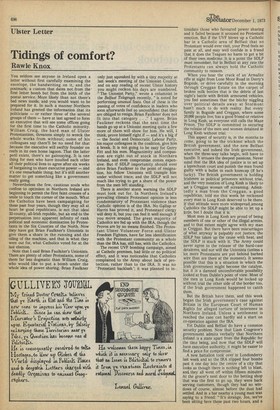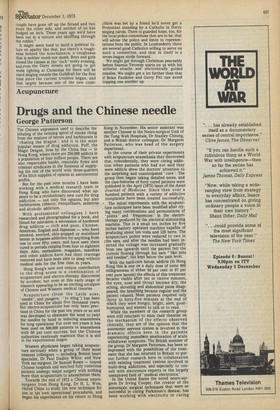Ulster Letter
Tidings of comfort?
Rawle Knox
You seldom see anyone in Ireland open a letter without first carefully examining the envelope, the handwriting on it, and the postmark; a custom that dates not from the ' first letter bomb but from the birth of the postal service. More likely than not there's bad news inside, and you would want to be prepared for it. In such a manner Northern Ireland has greeted the information that its politicians — or rather three of the several groups of them — have at last agreed to form an executive that will see some offices going for the first time to the Catholic minority. William Craig, the hard man of Ulster Protestantism, threatens simply to wreck the whole works from without; some of his colleagues say there'll be no need for that because the executive will swiftly founder on reefs in its own home lagoon. That the latter peril exists, there's no gainsaying. It is one thing for men who have insulted each other all their political lives to agree after six weeks of bargaining to share executive power — and it's one remarkable thing; but it's still another matter to get something like a government really going.
Nevertheless the few, cautious souls who confess to optimism in Northern Ireland are beginning to permit the first faint creases of a smile to touch the corner of the mouth. What the Catholics have been campaigning for these past four years, though they may all at heart be good republicans, is not that ideal 32-county, all-Irish republic, but an end to the perpetuation into apparent infinity of rank political and economic domination by Protestants in the Six Counties of the North. Now they have got Brian Faulkner's Unionists to give them a share in the running and the oiling of the machine, and that is what they were out for, what Catholics voted for at the last election.
Note that I said Brian Faulkner's Unionists. There are plenty of other Protestants, some of them far less dogmatic than William Craig, who would like to put a bomb under the whole idea of power sharing. Brian Faulkner -only just squeaked by with a tiny majority at ,last week's meeting of the Unionist Council, and on any reading of recent Ulster history you might reckon his days are numbered. " The Unionist Party," wrote a columnist in the Belfast Telegraph recently, "is noted for performing unusual feats. One of these is the passing of votes of confidence in leaders who soon afterwards feel so unconfident that they are obliged to resign. Brian Faulkner does not fit into that category . . ." I agree. Brian Faulkner reckons that the next time the hands go up at a Unionist meeting quite a few more of them will show for him. He will, I think, prove himself right if — and it's a big if — the Social and Democratic Labour Party, his major colleagues in the coalition, give him a break. It is not going to be easy for Gerry Fitt and his men. Magnanimity and compassion are right out of stock in Northern Ireland, and even compromise comes expensive. But if SDLP importunity should ever drive Brian Faulkner to the point of resignation, his fellow Unionists will trample him under without trace; and the SDLP will not much like trying to get a share of the power from the men left standing.
There is another storm warning the SDLP must look out for. In Northern Ireland's prevailing climate Protestant opinion is less condemnatory of Protestant violence than Catholic opinion is of the IRA. No GOlup or Harris has proved it, and Protestant' clergy will deny it, but you can feel it well enough if you move around. The great majority of Catholics are fed up with the IRA, though the Provos are by no means finished. The Protestant Ulster Volunteer Force and Ulster Freedom Fighters, have far less identification with the Protestant community as a whole than the IRA has, still has, with the Catholics.
The recent UVF bombing campaign, aimed at Catholic premises, had little or no political effect, and it was noticeable that Catholics complained to the Army about lack of protection, rather than to the IRA. It was no ' Protestant backlash '; it was planned to in
timidate those who favoured power sharing and it failed because it aroused no Protestant emotion. But if the UVF blows up a Catholic bar in a Catholic area of Belfast that no Protestant would ever visit, your Prod feels no pain at all, and may well confide in a friend that it does the Teagues no harm to get a bit of their own medicine. It is a point the SDLP must remember, for in Belfast at any rate the Protestants can always hold the Catholic community to ransom.
When you hear the crack of an Armalite rifle at night from Lone Moor Road in Derry's Bogside, or drive carefully in the morning through Creggan Estate on the carpet of broken milk bottles that is the debris of last night's battle with British armoured vehicles, you feel sometimes that the bitchy niggling over political details away at Stormont hasn't much to do with reality. But every family in Bogside and Creggan, where some 20,000 people live, has a good friend or relative in Long Kesh, as everyone still calls the Maze Prison. The SDLP is committed to securing' the release of the men and women detained in Long Kesh without trial.
This aspect of security is, in the months to come, going to be the trickiest which the British government, and the new Belfast executive, and indeed the Irish government, when the three-way talks begin, will have to handle. It arouses the deepest passions. Never mind that the IRA idea of justice is to set up a leprechaun court and punish the man found guilty with a bullet in each kneecap (if he's lucky). The British government is holding Irishmen as political prisoners without trial, and the very mention of Long Kesh is likely to set a Creggan woman off screaming. Admittedly a man from the Creggan, a good republican, told me this week he reckoned every man in Long Kesh deserved to be there. If that attitude were more widespread, among Catholics the SDLP might be able to let up a little, but I doubt that it is.
Most men in Long Kesh are proud of being members of one or other of the illegal armies, and to that extent might agree with my man in Creggan. But there have been miscarriages of what anyway is palpably not justice, the SDLP has taken up the cause with heat, and the SDLP is stuck with it. The Army could never agree to the release of the hard-case detainees, and nor will the Unionists (unless a lot more Protestants are put behind barbed wire than are there at the moment). It seems possible that this is a situation in which the Irish governinent might become the catalyst, but it is a damned uncomfortable possibility looked at from Dublin's point of view. Most of the men in Long Kesh would be locked up without trial the other side of the border too, if the Irish government happened to catch them.
But the British have them, and this week began the Irish government's case against Britain in the European Court of Human Rights for alleged torture of internees in Northern .Ireland. Unless a settlement is reached the case can hardly aid a start on co-operation against the IRA.
Yet Dublin and Belfast do have a common security problem. Now that Liam Cosgrave's government admits verbally that Northern Ireland is a state apart from the Republic for the time being, and now that the SDLP will have executive authority, it might be easier to find a price for compromise.
A new battalion took over in Londonderry last week and so the IRA slipped four bombs past it one day into the centre of a city that looks as though there is nothing left to blast, and they all went off within fifteen minutes. At the grocer's next door to the betting shop that was the first to go up, they were back serving customers, though they had no windows of course, almost before the dust had settled. And in a bar nearby a young man was saying to a friend: "It's strange, Joe, we've been sitting here these past two hours, and a
couple have gone otf up the Strand and two more the other side, and neither of us has budged an inch. Three years ago we'd have been out in a minute and shuffling through the rubble."
It might seem hard to build a political future on apathy like that, but there's a toughness behind the nonchalence, a toughness that is neither numb nor dumb. Boys and girls. crowd the classes at the ' tech ' every evening, and ,even the Derry streets are going to get some lighting at Christmas for there will be carol singing outside the Guildhall for the first time since the current troubles began, and that largely because one of the new coun cillors was bet by a friend he'd never get a Protestant standing by a Catholic in Derry singing carols. There is guarded hope, too, for the local police committees that are to be, that will advise the police and listen to representations from the public. In Londonderry there are several good Catholics willing to serve on such a committee, and that in itself is a seven-league stride forward.
We might get through Christmas peaceably before Seamus Twomey starts on us with his airborne attacks and electronically guided missiles. We might get a lot further than that if Brian Faulkner and Gerry Fitt can avoid tripping one another up.











































 Previous page
Previous page